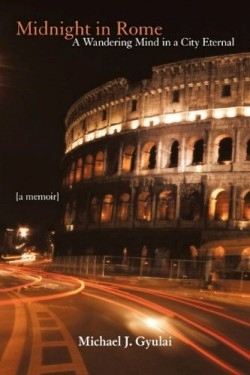Midnight in Rome
A Wandering Mind in a City Eternal
Midnight in Rome follows in the tradition of recent memoirs that chronicle a significant year in the life of the writer, like Julie and Julia or Colin Beavan’s No Impact Man. Newly graduated from UCLA, California native Michael J. Gyulai has $4,000 in the bank and the grudging support of his father when he sets out for his year in bella Roma. What better place for a young, well-educated, relatively privileged, and unattached artist? Gyulai soon finds apartment mates in the form of expatriate students, then sweet talks his way to receiving a health certificate. That paper—not a work permit—is the item necessary to get a job at a trendy night club.
What does this twenty-something have to tell about life in Rome? Not the expected sex, drugs, and rock-and-roll. Instead we get unrequited love, a dabbling in cocaine, and after-hours techno clubs. Of course, this young writer spends several pages dissecting the difference between coincidence and predestination, sparked by loves lost and met again.
Skye, an Icelandic student in a Rome theater school, is at the center of Midnight in Rome. Their relationship is apparently a one-sided infatuation that ends when the author decides the connection is friendship rather than love.
Gyulai sometimes moves beyond the Who Am I and Why Am I Here angst of youth and writes with insight and passion:
Writing music is a tantalizing task…The guitar has set limits and rules, a finite mathematical way in which the notes can be arranged. And those melodies and those chord changes, they hide there on the neck of the guitar, waiting for you to uncover them.
Conversely, there is a sense in places that the author is trying too hard. He often resorts noticeably to expanded and telling dialogue tags. Somewhat troubling as well are the strings of Italian words, which are only translated later in the narrative. This technique, meant to mimic the halting interchanges of conversing in a foreign tongue, slows the reading considerably.
Finally, many readers will wish more of the secondary characters were fleshed out as fully as Skye. Gyulai’s appreciation of Mariano comes close, but most of the others are bit players.
Midnight in Rome begins to close when Gyulai’s flight home looms: “Had I accomplished everything I wanted to accomplish? What had I come to Rome to accomplish? I had no answers.” The conclusion is not so much ambiguous as reassuringly open-ended. Those who like to see the world through another person’s window will find this to be a satisfying memoir.
Disclosure: This article is not an endorsement, but a review. The publisher of this book provided free copies of the book and paid a small fee to have their book reviewed by a professional reviewer. Foreword Reviews and Clarion Reviews make no guarantee that the publisher will receive a positive review. Foreword Magazine, Inc. is disclosing this in accordance with the Federal Trade Commission’s 16 CFR, Part 255.

